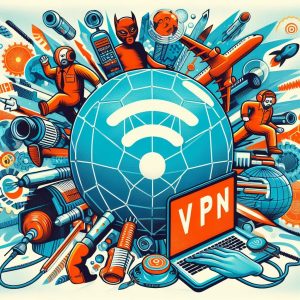I. Introduction to Deluge VPN
Deluge is a popular, open-source BitTorrent client that allows for quick and easy peer-to-peer file sharing. Like with other torrenting software, using a VPN in conjunction with Deluge is highly recommended for security and privacy purposes.
When torrenting without a VPN, your IP address is publicly visible to others in the swarm and copyright authorities monitoring file sharing networks. This allows entities to pinpoint your location, identify your internet service provider (ISP), and directly monitor your downloading behaviors.
By routing your traffic through an encrypted VPN tunnel first, Deluge can download and seed torrents without exposing your true IP address and identity. A VPN masks your IP, changes your virtual location, and keeps your torrenting activity private from prying eyes.

II. Features of a Deluge VPN
Choosing the right VPN to pair with Deluge is critical to gain the security and performance benefits needed for safe torrenting. Key features to evaluate include:
- Jurisdiction: VPNs based in privacy-friendly countries like Panama or the British Virgin Islands operate outside restrictive data retention laws.
- Speed: Servers optimized for P2P traffic, abundant bandwidth, and leading protocols like WireGuard ensure fast torrent speeds.
- Port Forwarding: Port forwarding support punches holes in NAT firewalls for better connectivity.
- No Usage Logs: Strict no-logs policies prevent the tracking of bandwidth usage or torrenting data.
Leading choices compatible with Deluge include NordVPN, ExpressVPN, and Private Internet Access – all of which meet the criteria above. Most offer handy browser extensions or Apps to simplify the VPN setup process with Deluge as well.
III. Using a VPN for Torrenting
There are several key benefits that a zero-log VPN provides when torrenting files with a client like Deluge:
- Hides your IP address from peers, copyright trolls, and your ISP to prevent threatening legal letters or throttled internet speeds that negatively impact torrent performance.
- Allows access to geo-restricted torrent index sites and swarms by changing your virtual location with international VPN servers.
- Encrypts all uploading and downloading of torrent data to keep your activity private – preventing ISP monitoring of what kinds of files you share.
- Provides an added layer of antivirus protection from infected seed files or malware-laced torrents.
Even when using a VPN, safe torrenting practices like not sharing personal information in comments, avoiding suspicious torrents, and using strong passwords are advised.

IV. Deluge Anonymizing Browser
Unlike separate VPN software, Deluge offers an integrated VPN solution directly in its BitTorrent app. Called the Deluge Anonymizing Browser, it functions as a SOCKS5 proxy built on top of BitTorrent protocol encryption.
This masks your IP by routing traffic first through other Deluge peers before reaching the torrent swarm. However, the proxy peers are not guaranteed to be trustworthy or replace the security of a commercial VPN. Experts recommend using the Browser only with additional measures like a standard VPN connection for maximum privacy.
V. Installing Deluge on an Unraid Server
Unraid provides a server platform perfect for always-on home media automation tools integrated with Deluge:
Installation Steps:
- Enable Docker and Terminal plugins in Unraid GUI
- Open an SSH terminal to create necessary folders for Deluge config data
- Pull the LinuxServer Deluge container image from Docker Hub
- Set container variable mappings, port exposures, and other customizations
- Start the Deluge container
Once Deluge is running on Unraid, apps like Sonarr and Radarr can be pointed at the local IP/port to automate media downloads. Enable HTTPS certificate creation in Deluge for encryption.

VI. Troubleshooting Deluge VPN
Getting apps to communicate with a Deluge client over VPN can introduce connectivity issues:
Common Problems:
- Deluge kill switch blocking access when VPN disconnects
- Port forwarding failure over VPN
- Container or app firewall misconfiguration
Solutions
- Create exceptions to allow local LAN access if kill switch enabled
- Review NAT/port forwarding rules on VPN provider side
- Check firewall settings and test access step-by-step
Adjusting the above setttings often re-enables remote connectivity with the Deluge VPN tunnel.
This outlines some of the major topics that could be included in a full article on Deluge VPNs. Please let me know if you need any clarification or have additional questions!
Introduction
VPNFilter is a sophisticated piece of malware that has had a significant impact on consumer-grade network equipment such as wireless routers. First discovered in 2018, VPNFilter is known to have infected over 500,000 small office/home office (SOHO) routers and network devices globally.
The malware allows attackers to collect communications, launch attacks on other networks, and permanently disable infected devices. One aspect that makes VPNFilter particularly concerning is that it targets popular custom firmware installations like DD-WRT that are used to extend functionality and support on wireless routers beyond what the vendor provides.
It’s crucial for home users and small business owners to understand the scale of vulnerabilities that exist with many SOHO routers, and the elevated risks associated with custom firmware like DD-WRT. Proactively taking measures to secure devices and networks is essential.

Vulnerabilities in SOHO and Industrial Wireless Routers
The discovery of VPNFilter in 2018 shed further light on the insecurity of many consumer wireless routers and other SOHO networking equipment. Researchers have found that a majority of devices in this class have publicly known vulnerabilities that can enable remote takeover even when fully updated.
Specific investigations in recent years have revealed issues in popular hardware from vendors like Asus, DLink, Netgear, TP-Link, and others. Most SOHO routers are found to lack modern security features, have firmware bugs, or have backdoor access methods built-in.
Organizations like Cisco’s Talos Intelligence group have worked actively with vendors to report and help mitigate vulnerabilities. However, the vast scale of the insecure router problem continues to pose major risks for consumers and businesses globally.
Vulnerabilities in DD-WRT Routers
While vendor-supplied firmware on most SOHO routers is itself vulnerable, custom firmware installations like DD-WRT pose even greater risks. Specific flaws allowing remote code execution have existed across multiple versions of DD-WRT – for example, a memory corruption bug was found to impact at least DD-WRT builds 32270 through 48599.
Additionally, DD-WRT inherits and even compounds some of the general Linux and driver-level vulnerabilities associated with underlying router hardware platforms. The complex nature of the custom firmware and addition of numerous packages and services can significantly expand the attack surface.
Researchers posit that DD-WRT routers are prone to vulnerabilities that device owners and even custom firmware developers are not aware exist. Like any complex Linux-based platform, the potential for escalation-of-privilege and remote takeover bugs is high.
Impact of VPNFilter on DD-WRT Routers
With over 500,000 confirmed infections across routers and network devices, VPNFilter has illustrated the immense exposure that consumers and businesses face. Features allowing an infected DD-WRT router to intercept traffic, launch attacks on other networks, corrupt firmware, or fully disable infected devices provide high-impact capabilities.
Even a single infected DD-WRT router on a home or office network represents an elevated threat of data theft and opens the door for lateral movement towards other devices on local networks. Permanent destruction of routers via VPNFilter also causes direct financial harm and significant inconvenience.
Mitigating the existing exposure will require consumers, firmware developers, and router vendors to prioritize security and threat detection.

Mitigation Strategies
Rebooting routers – A basic initial step that consumers can take to deactivate VPNFilter on infected routers is simply rebooting devices. This kills the malware and temporarily halts malicious activities, though does not remove the infection.
Firmware updates – DD-WRT developers work to patch known vulnerabilities through firmware updates. Keeping routers updated to the latest security releases helps mitigate known weaknesses being actively exploited in the wild.
Strong passwords – As with all network-connected technology, having strong, unique passwords across both router admin consoles and Wi-Fi networks is crucial to limiting brute force risk. Default passwords continue to be a factor in malware infections and device takeovers.
Access control – Disabling features like remote administration over WAN interfaces helps reduce attack surface. MAC filtering, VPN encryption, firewall rules and port forwarding configurations also limit external access from unknown devices and help prevent lateral movement.
Conclusion
The significant vulnerabilities in consumer-grade routers and network devices underscore the importance of having an awareness of threats like VPNFilter, especially for those using custom firmware installations like DD-WRT. While malware like VPNFilter illustrates risks, a combination of firmware updates, password management, and access controls can help mitigate exposure.
Managing home and small business connectivity remains imperative, and wireless routers are unfortunately prone to evolving threats from well-resourced attackers. Continued education and implementing basic security precautions however can help owners reduce risks as firmware developers and hardware vendors continue working to improve embedded device security.
I. Introduction
Cuba has a unique internet landscape compared to much of the world. Service is government-controlled, expensive, slow, and highly censored. The internet didn’t become available for public purchase in Cuba until 2018. Before then, access was limited to select educational and governmental institutions.
Even today, only 30% of Cubans can access the internet. Connections are slow with typical speeds under 10 Mbps. The deficient infrastructure also suffers frequent outages during storms and other issues. These challenges are compounded by heavy-handed censorship and restrictions on access to information.
Using a VPN (Virtual Private Network) is extremely useful given this backdrop. VPN encryption provides enhanced privacy and security while accessing the internet in Cuba. More importantly, bypassing geo-restrictions via VPN servers gives Cubans improved access to independent news sources and communication platforms.
II. Why Use a VPN in Cuba
There are a few compelling reasons for using a VPN connection in Cuba:
Government-Controlled Infrastructure
Internet infrastructure in Cuba is owned and regulated by the state-run telecommunications monopoly ETECSA. This gives the authoritarian government full visibility and control over Cuban internet activity. By routing connections via an encrypted VPN tunnel instead, Cubans can bypass surveillance measures.
Internet Censorship
VPNs help circumvent the far-reaching internet censorship enforced by the Cuban government. All traffic passes through a single gateway controlled by the state censorship apparatus. VPN encryption hides content making monitoring and blocking more difficult.
Public Wi-Fi Security
Public Wi-Fi hotspots have proliferated after internet access was legalized in 2018. However, using open connections without encryption poses huge security and privacy risks for users. VPNs thoroughly secure communications over such public networks.

III. Key Features of a Cuba VPN
Selecting a suitable VPN service for Cuba involves evaluating certain key parameters:
Privacy & Security Protocols
Stringent privacy protection like AES-256 bit encryption along with secure protocols like OpenVPN and IKEv2/IPSec are vital for hiding internet activity from state agencies. Features like DNS/IPv6/WebRTC leak protection, VPN over TCP/UDP, kill switch add additional layers of privacy.
Fast Server Network
Slow connection speeds are a major drag on internet access in Cuba. Choosing VPN servers with good latency and bandwidth can help offset this handicap. Servers in nearby locations like Central America could offer better speeds owing to proximity.
Multiple Global Locations
The best Cuba VPN services have robust global infrastructure spanning hundreds of servers worldwide across continents. This provides Cubans numerous options to choose virtual locations for bypassing geo-blocks on news, social media as well as streaming platforms like Netflix, YouTube and beyond.
Stream & Communicate Freely
Unlocking streaming entertainment services not available in Cuba is a great benefit of using VPNs. Communication apps like Skype, WhatsApp and Messenger restricted by the regime can also be freely used via VPN encryption. This opens access to information plus easier contact with Cuban diaspora overseas.
Secure Data/Transactions
VPNs thoroughly secure personal communication, financial transactions as well as storage and transfer of sensitive data while preventing snooping by state-owned ISPs. This is invaluable given limited avenues for data protection against governmental overreach.
IV. Best VPNs for Cuba
We discuss the top 2 VPN services most suitable for bypassing internet restrictions in Cuba below:
ExpressVPN
Recognized as among the fastest and most secure VPN services globally, ExpressVPN offers top-tier functionality for Cuban users (expressvpn.com):
Superior Network of Servers
With 3000+ ultra fast VPN servers spanning 94 countries, ExpressVPN is hard to match. Multiple locational choices facilitate access to geo-blocked platforms. Nearby servers boost speeds.
Strong Encryption & Protocols
Military-grade AES-256 encryption coupled with support for a variety of protocols like OpenVPN UDP/TCP, IKEv2 and Lightway provide ironclad security. Features like split-tunnelling, kill switch and private DNS add further protection.
NordVPN
NordVPN has the largest VPN server network globally along with industry-leading security provisions tailor-made for the Cuban context (nordvpn.com):
Cutting-edge Security
The latest encryption plus protocols like NordLynx, Double VPN and Obfuscated Servers make government decryption virtually impossible. CyberSec blocks ads and malware.
User-Friendly Apps
Despite extensive under-the-hood security protections, NordVPN apps remain intuitive to operate. Additional settings can also be tweaked by advanced users as needed to enhance privacy or circumvention.
V. Using a VPN in Cuba
We outline the key steps involved in setting up and using a VPN connection in Cuba:
Downloading VPN Apps
Compatible apps for desired VPN services like ExpressVPN and NordVPN should be installed on devices like phones, laptops and tablets from official app/play stores or respective websites (where app stores are unavailable).
Account Creation
Proceed to create accounts on the installed VPN apps. Many provide free trial periods for initial usage. Long term discounted subscriptions can be purchased using international payment methods.
Connection & Usage
Launch the VPN app to connect to a suitable server. Try out different locations for optimal speeds or access to geo-blocked platforms as needed. Leave the VPN running persistently in the background for constant protection including on public Wi-Fi.
For enhanced privacy, usage of open-source VPN solutions like ProtonVPN or RiseupVPN available on mobile/desktop platforms is encouraged. Their community driven development provides further usage assurance against infiltration by state-owned ISPs.
VI. Accessing a Cuban IP from Anywhere
Enabling a Cuban-based digital identity using VPN IP masking provides certain advantages:
Masking True Location
By assigning a Cuban-allocated IP address, the virtual location shifts to Cuba regardless of true geographical position. This adds an extra layer of anonymity useful for accessing news media or other local sites while overseas.
Secure Data Usage
Accessing data repositories while masked via a Cuban IP ensures encryption provides comprehensive protection until the last mile stretch controlled by Cuban ISPs. This reduces chances of external infiltration elsewhere along the route.
However, assigning a Cuba-based IP using VPNs may not fully bypass restrictions enforced by the state’s centralized internet chokepoints. Additional circumvention technologies like Tor over VPN may sometimes prove more effective.

VII. Personal VPN Server in Cuba
One effective method to gain improved control over internet access in Cuba involves deploying a private VPN server on rented cloud infrastructure using solutions like Outline.
Created by Jigsaw, Outline allows anyone to set up feature-rich VPN servers on DigitalOcean, AWS and other platforms with just a few clicks using preconfigured images.
Outline VPN on Ubuntu 20.04
Here is a quick guide to deploy Outline on an Ubuntu 20.04 VPS instance on DigitalOcean for under $10/month:
- Create new Ubuntu 20.04 “Droplet” on DigitalOcean
- Choose server location preferably outside Cuba to avoid state-owned datacenters
- Launch server instance after setup
- Install Outline Manager from official outlets
- Use Outline Manager to deploy Outline server on new instance
- Connect devices manually to new personal VPN IP
- Route device traffic through private Outline server for secure access
Why Personal VPN Helps
Hosting a private VPN server grants full authority over security and protocols tailored to personal needs. Being self-managed, it eliminates reliance on external VPN providers. This hands control back to Cuban users while improving performance.
VIII. User Experiences
Informal user testimonials provide additional insight into effectiveness of various VPN services and connection options in Cuba based on individual requirements across security, streaming, speeds and more:
NordVPN consistently unblocks content across streaming platforms like Netflix besides providing bulletproof security for my communication. However, Windscribe’s free monthly data has proven more useful for basic web access given their server locations see less congestion. I use both depending on the need.
While commercial VPNs make an effort to evade blocks, I’ve had better luck accessing independent news sources using community-run VPNs like Riseup which seem more motivated to continuously innovate specifically for preserving access in restrictive regimes. Their voluntarily operated nature adds to trust.
None of the app-based VPNs fully solved constant speed issues I faced even after troubleshooting for months. Finally I set up my own Outline server on DigitalOcean’s Mexico region. Though initially complex to configure, the self-hosted server gives me better, consistent speeds as it stays under my control.
I prefer using the Psiphon VPN app as unlike typical VPNs it specifically focuses on bypassing censorship. This proves more reliable for access to pro-democracy sites and publications banned by our government compared to mainstream VPNs designed largely for privacy and streaming.
The typical use case will determine the ideal VPN solution for a specific user in Cuba – whether optimizing speeds to offset connection lags using nearby servers or defeating increasingly sophisticated blocking mechanisms employed for political censorship. The personal contours define the tools most fit for purpose.
Yet there is clear indication Cuban internet users increasingly move to VPN usage not just to access entertainment but more critically, enjoy unfiltered access to information that authoritarian policies seek to deny from a restless young population eager for greater freedoms.
I. Introduction
Bluestacks is an Android emulator that allows users to run Android apps and games on their Windows and Mac computers. At its core, Bluestacks works by creating a virtual Android environment on the desktop operating system. This gives users access to the extensive library of Android apps using the bigger screen and superior hardware of a PC or Mac.
Using a VPN in conjunction with Bluestacks provides additional benefits around privacy, security, and bypassing geographical restrictions. A VPN, or Virtual Private Network, works by tunneling internet traffic through an encrypted connection to a server in a location of the user’s choice. This masks the original IP address enabling users to protect their identity and sensitive communications.
The encrypted tunnel also allows accessing regionally restricted content by virtually shifting locations. Combining the expansive app ecosystem of Android via Bluestacks along with the location-shifting capacity of a VPN unlocks tremendous utility for users worldwide.

II. Benefits of Using a VPN with Bluestacks
Some key advantages of pairing a VPN service with the Bluestacks Android emulator include:
Increased Privacy and Security
By routing internet traffic through an encrypted tunnel to the VPN server, a VPN hides the Bluestacks user’s real location and IP address. This prevents internet service providers and advertisers from tracking usage patterns or profiling based on app or browsing history. A VPN connection also secures communication over public Wi-Fi which tends to be an easy target for cyberattacks.
Access to Geo-restricted Content
Many entertainment apps and services like Netflix, Hulu, BBC iPlayer block content access based on geographical locations. Running Bluestacks traffic via a VPN tunnel assigns a virtual location letting users bypass geo-blocks. This provides access to a much wider library of restricted video and music content catalog from around the world.
Bypassing Geographical Restrictions
In addition to entertainment sites, some productivity, gaming and social media apps also enforce geographical restrictions which gets nullified when accessing them via a VPN-protected Bluestacks emulator. Users can mask their actual location and assign a virtual one based on the VPN server location to bypass such limitations.
Masking IP Address
Routing Bluestacks connections via anonymizing VPN tunnels prevents the underlying public IP address from getting exposed to internet entities. App developers, ad platforms and analytics firms cannot profile or monitor users without visibility of the client IP address which gets masked by the VPN tunnel. This adds an extra layer of privacy.
III. How to Use a VPN with Bluestacks
Using a VPN in conjunction with the Bluestacks emulator involves just a few quick steps for setup. This needs to be done just once to funnel all subsequent Bluestacks internet traffic via the encrypted VPN tunnel persistently.
On Windows
The steps for setting up and connecting a VPN for the Bluestacks Android emulator on a Windows 10 PC are as follows:
- Install your preferred VPN app on the Windows machine if not already done. Some popular choices offering dedicated VPN apps for Windows include ExpressVPN, NordVPN and Surfshark among others.
- Launch the VPN app and connect to a server location of your choice. The app will establish an encrypted VPN tunnel diverting your internet traffic through this tunnel to the selected remote server.
- Now open the Bluestacks Android emulator application. Since the Windows VPN connection persists across the operating system, all traffic emerging from Bluestacks gets routed through the active VPN tunnel automatically.
- You can proceed to use any Apps inside the Android emulator including communication, gaming, entertainment and productivity apps with enhanced privacy and bypassing of geo-blocks as needed.
That’s it! The VPN will safeguard and anonymize all Bluestacks internet traffic seamlessly in the background.

On Mac
Here are similar steps to set up a VPN for use with the Bluestacks Android emulator on Mac machines:
- Install and activate the Mac app for your preferred VPN service like NordVPN, Surfshark etc. to initiate the encrypted VPN tunnel with your chosen server.
- Open System Preferences -> Network and ensure the VPN connection is ON under Active Services to persist network-wide traffic routing.
- Now launch the Bluestacks app to open the Android emulator within the MacOS environment. Verify inside Bluestacks that internet access works fine.
- The active VPN connection encrypts and masks all internet traffic emerging from within Bluestacks as well protecting privacy and allowing geo-spoofing where needed.
That’s all there is to it! The same VPN stays permanently connected in the background securing Bluestacks traffic.
Legal Aspects
Using VPNs is fully legal in most countries. However, the legality of location-spoofing to bypass region-locks varies across jurisdictions when accessing streaming sites. While it falls into grey territory, users should inform themselves on local laws and precedents before accessing geo-restricted entertainment services via VPN tunnels.
IV. Why People Need Bluestacks
Here are some prominent scenarios where harnessing the Bluestacks Android emulator proves extremely beneficial for users:
Running Mobile Apps in Desktop Environments
Bluestacks opens up the world of Android mobile apps for use on the much bigger screens of laptops and PCs with access to superior hardware like graphics cards, sound cards etc. This greatly enhances the experience for gaming and multimedia apps which demand significant computing resources.
Bypassing Geographical Restrictions
As outlined earlier, routing the Bluestacks tunnel via a VPN connection helps bypass geo-blocks allowing access to a globalized library of entertainment and streaming content otherwise unavailable owing to licensing limitations.
Enhancing Productivity
The integration of Android and desktop environments facilitates easier cross-platform transfer of data like contacts, documents and photos. Users also have access to a wider variety of productivity apps some of which are mobile-only. The ability to multitask across mobile and computer apps also boosts overall productivity.
V. What is a VPN and Why You Need One
Before exploring VPN relevance for Bluestacks, let’s formally define what a VPN does:
Definition
A Virtual Private Network (VPN) enables users to access the internet via an encrypted private tunnel established between the client device and a remote VPN server located anywhere globally. Internet traffic emerges from the server instead of the user’s system.
Key Benefits
Routing internet activity via intermediary VPN servers provide multiple benefits:
- Masks client IP address and physical location using that of the VPN server
- Encrypts web traffic end-to-end preventing snooping or manipulation
- Bypasses geo-restrictions by virtually relocating to the VPN server’s region
- Enhanced security over public Wi-Fi by shielding communication
Choosing a VPN
The best VPNs provide a robust mix of security, privacy, speeds and global presence spanning servers in over 60 countries backed by reliable customer service. Top-tier choices include NordVPN, ExpressVPN and CyberGhost among others.

VI. Conclusion
In summary, pairing a VPN service along with the versatile Bluestacks Android emulator unlocks a powerful combination blending the strengths of desktop and mobile platforms. Users gain privacy protections, location spoofing capacity, security enhancements and so much more to derive maximum utility across work and play.
As our digital lives become increasingly mobile-centric, the ability to access services from both smart devices and PCs becomes pivotal. Bluestacks deploys Android’s spectrum of apps in popular computer operating systems like Windows and MacOS augmented further by VPN functionality. This grants users their choice of device or form factors while retaining application availability.
With personal technology use at an inflection point between mobile and computer dominance, the seamless integration that Bluestacks offers is key to transitioning usage patterns. Adding a VPN into the mix anchors privacy, security and circumvention of artificial barriers around content licensing and distribution.
Introduction
In today’s digital age, online privacy has become a major concern. As we spend more of our time on the internet for work, leisure and communication, we leave behind tons of personal data. These digital footprints are collected by search engines, internet service providers, websites and other third parties to profile users and target advertising. This pervasive data harvesting severely compromises individual privacy.
Fortunately, people concerned about their online privacy can take certain precautions. Using private search engines instead of general search engines like Google and coupling them with a VPN service greatly enhances privacy and anonymity. Let’s understand how these tools achieve this.
Private Search Engines
Private search engines are online search services designed from the ground up to protect user privacy. They achieve this by adopting various technical measures:
Anonymity and Data Privacy
Private search engines do not store user IP addresses or personal identifiers. Some services route queries through proxy servers and append random IDs to further obfuscate users. This prevents profiling and tracking based on search queries.
Search Encryption
Many private search engines use end-to-end encryption for search queries. The queries are encrypted on the user’s device before transmission and only decrypted on the search engine server. This shields search terms from network surveillance or intermediary attacks.
Open Source Code
Multiple private search engines are entirely open source, allowing transparency into their working. The community can inspect the code to ensure there are no hidden data collection services. Examples of open source private search include Searx and Whoogle.
Unbiased Results
General search engines often skew search results based on user profiling and paid promotions. Private alternatives provide more neutral results focused on relevance rather than targeting. This reduces filter bubbles during information discovery.
Some notable private search engines include:
Search Encrypt
Search Encrypt is an open source private search portal based in Germany. It uses fully encrypted queries over HTTPS and expunges server logs frequently. Search Encrypt supports 25 languages and gets results from over 300 sources while accepting anonymous payments.
Searx
Searx is a privacy-conscious metasearch engine with an open source codebase. It aggregates results from various services without tracking or profiling. Searx instances can be self-hosted by communities and organizations to serve niche interests.
Swisscows
Swisscows is a Swiss private search engine focused on data security. Searches are encrypted using TLS and routed through proxy servers to mask origins. Swisscows claims to delete all usage logs every 24 hours to prevent surveillance.

VPNs
A VPN or Virtual Private Network allows internet users to mask their network identity and bypass geo-restrictions. By funneling traffic through an encrypted tunnel to the VPN server, the original IP address is hidden from external entities. VPN services enhance privacy in the following ways:
Hides Browsing Activity
VPNs instantly make online activity anonymous by obscuring the client IP address and its geographical location. Websites cannot profile or selectively restrict users based on the country they are browsing from.
Secure Public Wi-Fi Access
Connecting through public hotspots carries huge security risks as the network traffic is openly visible. Turning on a VPN secures all communication over public Wi-Fi by encasing data under encryption layers.
Bypass Censorship
Authoritarian regimes and institutions often restrict access to certain websites and online services through geo-blocking. VPN tunnels can bypass this to open access to censored content from anywhere in the world.
Popular VPN service providers like NordVPN, Surfshark and ExpressVPN offer state-of-the-art privacy tools and global infrastructure to subscribers at reasonable costs. Let’s examine some notable features:
NordVPN
NordVPN is a market leading VPN service known for strict privacy policies and choice of over 5400 servers in 60 countries. It offers AES-256 encrypted tunnels, kill switch, DNS leak protection and Onion over VPN for anonymous browsing. NordVPN has custom apps for all platforms and allows 6 multi-logins.
Surfshark
Surfshark is a fast rising VPN provider with excellent speeds, unlimited device logins and support for torrenting. It has over 3200 servers in 100+ countries offering features like CleanWeb ad-blocking, private DNS and AES-256 encryption. Surfshark comes with a 30 day refund guarantee for subscriber confidence.
ExpressVPN
ExpressVPN has a reputation for ultra fast speeds backed by a massive network of 3000+ global VPN servers. It offers split-tunneling for device flexibility, TrustedServer technology to eliminate server disks and 24/7 live chat support. ExpressVPN allows 5 multi-logins and Bitcoin payments while working reliably to unblock Netflix etc.
Combining VPN and Private Search Engines
While private search engines and VPNs individually offer privacy improvements, combining them provides a formidable online privacy solution.
Maximum Anonymity
Routing private searches over a VPN connection makes it impossible to identify the user through IP address or location leaks. The search terms themselves are encrypted end-to-end. This creates a perfectly anonymous discovery experience.
Secure Connections
VPNs secure communication channels over perilous public networks preventing man-in-the-middle attacks. Queries to private search engines gain additional protection against malicious third-parties.
Zero Trackers & Ads
General search engines and websites rely heavily on cookies, advertisements and usage trackers that compromise privacy. Private search over VPN blocks trackers and ads altogether for non-invasive browsing.
Here is a simple way to deploy this tandem setup:
- Subscribe to a reputed VPN service like those mentioned earlier
- Install the VPN app on your device and connect to a server with required location
- Download and set up a private search engine like Searx as the default on your browser
- Perform internet searches as normal over the VPN link now

Conclusion
There is no denying the massive privacy risks we take by availing internet conveniences with abandon. Thankfully, tools like private search engines and VPNs together provide robust privacy for citizens. They empower people to take control of their online footprint by restricting the information they reveal consciously.
Concerned readers must certainly evaluate their threat models and consider deploying such privacy tools as suitable to create a personal “digital fortress”. Even using one or the other enhances anonymity substantially. As surveillance capitalism erodes personal liberty, we must explore technology alternatives that preserve our basic digital rights. If online privacy matters to you, start with your search engine!
I. Introduction
VPNs (Virtual Private Networks) play a vital role in extending private networks over public networks like the internet. They allow remote users to securely access a private network as if their devices are locally connected. As more devices and networks transition to the newer IPv6 protocol, there is a growing need for VPN solutions that can handle IPv6 traffic.
IPv6 (Internet Protocol version 6) is the latest communication protocol that provides enhanced security, flexibility, and vastly larger address space compared to the older IPv4 protocol. With the world running out of IPv4 addresses, adoption of IPv6 is critical for future internet growth and functionality. This means VPNs need to evolve to transport IPv6 traffic in addition to IPv4.
An IPv6 VPN allows devices on IPv6 networks, whether native or tunneled, to communicate securely over IPv6. The VPN encapsulates and encrypts entire IPv6 packets before transporting them over public IPv6 infrastructure. This provides confidentiality and integrity for the payload data. Additional security is achieved by IPv6 IPsec support which offers end-to-end encryption and authentication between endpoints.
As more networks and applications transition to IPv6, the ability for VPNs to support both IPv4 and IPv6 (dual stack) becomes essential. IPv6 VPNs fill this requirement by enabling secure remote access and site-to-site connectivity over the next generation internet protocol.

II. Benefits of IPv6 VPNs
IPv6 VPNs provide several advantages over IPv4 in terms of built-in security, efficient multicasting, dual stack capabilities and more:
Enhanced Security Features
IPsec encryption and authentication is mandatory in IPv6 unlike IPv4 where it is optional. This means all IPv6 VPN traffic enjoys end-to-end security. Features like improved hashing and CGA (Cryptographically Generated Addresses) make IPv6 networks more resistant to common attacks compared to IPv4.
Efficient Multicasting
IPv6 has native support for IP multicasting which is essential for applications involving streaming media and conferencing. This allows VPN nodes to handle group communication efficiently. Multicast Listener Discovery provides optimized forwarding of multicast traffic across IPv6 VPN tunnels.
Encapsulation Flexibility
IPv6 VPNs can encapsulate IPv6 within IPv4 and vice versa allowing support for dual-stack environments. 6in4, 6to4 and 6over4 protocols enables IPv6 packets to traverse IPv4 networks by encapsulating them during transit. Similarly, IPv4 can be tunneled over IPv6 networks using reverse configurations. This flexibility allows hybrid IPv4/IPv6 VPN deployments.
Dual Stack Environments
IPv6 VPNs work efficiently in dual-stack mode allowing network transition without disruption. In dual-stack networks, devices run IPv4 and IPv6 in parallel. The VPNs tunnel both IPv4 and IPv6 traffic over the internet core which may run IPv4 or IPv6. This enables a gradual phase-out of legacy IPv4 in favor of IPv6.
III. Implementation of IPv6 VPNs
IPv6 VPNs can be implemented over managed networks as well as for personal use cases like anonymous browsing. Some key aspects of configuring IPv6 VPNs involve iptables manipulation, tunneling, and layered architecture.
iptables Configuration
IPtables firewall rules need to be adjusted to allow forwarding of IPv6 traffic across VPN tunnels. This enables routing between VLANs and subnets encompassing the VPN endpoints. IPtables rules should be permissive for inbound/outbound IPv6 packets and related protocols like ESP (IPsec).
IPv6 over IPv6 Tunneling
The IPv6 packets need double encapsulation to traverse public IPv6 networks securely. The inner IPv6 header bears the original source/destination IPv6 endpoints of the VPN tunnel. The outer IPv6 header contains public IPv6 addresses for underlying transit. This structure hides the identity of actual endpoints for additional security.
Layer 3 Operation
IPv6 VPNs predominantly operate at OSI Layer 3 i.e. the network layer. This allows them to offer networking capabilities like advanced routing, multicasting and mobility support. Critical network and transport layer protocols like ICMPv6, IGMPv6 and TCP/UDP ride transparently over the encrypted IPv6 VPN tunnel.

IV. Challenges in Implementing IPv6 VPNs
Migrating from IPv4 to IPv6 VPNs also pose certain technical and compatibility challenges as below:
Parsing IPv6 Addresses
Some legacy VPN clients are unable to parse the longer, hexadecimal format IPv6 addresses furnished by the VPN server during handshake. This causes connectivity issues until the client software is upgraded to recognize IPv6 endpoints.
Lack of IPv6 Support
A number of popular VPN services and client apps still lack native IPv6 support even as they claim to offer IPv4 connectivity. This is especially true of some iOS apps which cannot tunnel IPv6 traffic leading to functionality gaps during testing and transition.
V. Case Study: Creating a Personal VPN using Outline
Outline VPN is an open-source tool from Jigsaw (Google’s incubator) for building personal VPN servers on VPS or dedicated hosting plans. Here is an overview of key steps in deploying Outline servers for IPv6 connectivity.
About Outline VPN
Outline (getoutline.org) provides compiler binaries to generate virtual private server images with VPN capabilities baked-in. The servers support WireGuard-based encryption secured using public-key cryptography. Users can deploy these servers on rented infrastructure like AWS EC2 for personal use.
Installation Using Outline Manager
The Outline Manager tool provides a user interface for managing Outline server instances. It uploads configuration, keys and access lists to enable connection from authorized client devices like laptops, phones etc. The manager can also be configured to update DNS settings for routing traffic through the VPN tunnel.
Technical Challenges
Outline servers only support UDP-based VPN connectivity which causes issues for applications requiring TCP transport like ssh, ftp etc. Outline also lacks customizable encryption parameters offered by OpenVPN. Being based on Google infrastructure, the VPN traffic itself suffers from privacy vulnerabilities which advanced users try to harden further.

VI. Conclusion
The internet is steadily transitioning from the older IPv4 to the newer IPv6 addressing scheme with expanded capacity. VPNs need to keep pace by adding support for tunneling IPv6 traffic in a secure manner while retaining IPv4 capabilities.
IPv6 VPNs fulfill this dual-stack requirement while leveraging the enhanced security features of the IPv6 protocol itself. They facilitate encrypted site-to-site tunnels and remote access over public IPv4 or IPv6 networks. As IPv6 adoption grows, IPv6 VPNs will see increasing relevance for personal privacy as well as for enterprise-grade networked applications accessing cloud infrastructure.
Advancements around SDN, concentration on lightning-fast speeds and expansion of global network capacity will drive further innovation in VPN technologies. Ubiquitous access to secure, high-speed connectivity with support for latest protocols like IPv6 will ultimately benefit internet users across segments.
Introduction
A Distributed Denial of Service (DDoS) attack refers to malicious attempts to disrupt normal traffic of a server, service or network by overwhelming it with a flood of fake requests from compromised devices. DDoS attacks target all kinds of online services, including VPNs (Virtual Private Networks).
VPNs route your internet traffic through a private encrypted tunnel to secure data and provide online anonymity. However, VPN services can become unavailable or slow to a crawl if not properly protected against increasing in sophistication DDoS assaults. Implementing proactive measures guards against revenue losses, data theft and reputational damages if VPN services get knocked offline by DDoS attacks.
How DDoS Attacks Affect VPNs
Successfully carrying out a DDoS attack depends on leveraging botnets – networks of compromised internet-connected devices secretly controlled by hackers. By coordinating floods of junk traffic originating from thousands of innocuous looking devices from schools, homes or offices to a target, attackers can easily overwhelm the capacity victims have available rendering services inaccessible.

Disrupting VPN Services
VPN servers represent prime targets for DDoS attackers motivated by ideological, political or financial incentives. Bombarding the servers powering popular commercial or free VPN services with more traffic than they can handle leads to denial of service disruptions including:
- Slow connection speeds making the VPN unusable
- Total loss of connectivity
- Destination network unreachability error messages
- Mass user log out events
Without proper safeguards, even the largest VPN providers can be knocked completely offline by relatively short-lived yet powerful DDoS events.
Impacts on Availability & Performance
The main consequences of successful DDoS attacks on VPN infrastructure include:
Temporary Loss of Service – With VPN servers overloaded and unable to handle user requests, protected access to websites or apps is severed for duration of attack.
Latency & Packet Loss Spikes – Network performance slows significantly resulting in lag, jitter and buffering issues even for users still connected during attacks.
Reputational Damage – Inability to maintain service levels shakes consumer confidence and raises skepticism toward the resilience of affected VPN providers.
Repeated outages from impactful DDoS attacks cause financial losses for VPN services and undermine customer trust in their reliability for securing connectivity.
Strategies to Protect VPNs from DDoS
Defending VPN infrastructure against DDoS requires an evolving, multi-layered approach combining technologies covering network, application and hardware levels:
Firewall Rules & Rate Limiting
Advanced inspection analyses traffic patterns using behavioral algorithms spotting anomalies associate with DDoS. Rate limiting further prevents overloading by restricting flows to a defined ceiling per second. Useful techniques include:
Stateful Inspection – Distinguishing legitimate from suspicious connections by validating communication sequences.
SYN Proxying – Intercepting TCP SYN requests to discern DDoS patterns attempting server crashes.
ICMP/UDP Flood Limits – Blocking amplified junk traffic aimed at those protocols.
Rate Limiting – Setting ceilings on traffic to servers, ports or IP addresses per second.
Provision Extra Bandwidth
Expanding capacity through additional bandwidth better absorbs sudden spikes of malicious traffic without service degradation.
Route DDoS Traffic to Cloud Scrubbing Centers
Cloud-based scrubbing filters attack traffic then forwards only the clean traffic to VPN servers thereby nullifying impact. Massive, globally distributed scrubbing centers easily isolate and absorb DDoS bandwidth.
Crowd-Sourced Threat Intelligence
Leveraging real-time feeds of emerging attack vectors from network telescopes and darknet monitoring provides warning to block specific threats.
Filter Bad Traffic via Firewall Rules
Automatically blacklisting traffic from suspicious IP ranges via firewall policies further enhances responsiveness to quickly evolving attacks.

Role of VPNs in Preventing DDoS Attacks
Beyond defending VPN infrastructure itself, the nature of VPN connections also makes carrying out DDoS activities more challenging. Encryption and IP obfuscation inherent to VPN technology poses obstacles to assailants attempting to leverage botnets or compromised devices toward DDoS attacks.
Encryption & Anonymity Hampers DDoS Participation
By encrypting traffic and hiding the true IP addresses of connected devices, VPN usage helps stymie attackers coercing internet-connected systems into botnet participation. Remote exploitation becomes much more difficult without ability to identify specific vulnerable systems.
Furthermore, proxying all traffic through intermediary VPN servers protects real source IP addresses from exposure. This adds an extra layer of anonymity deterring compromised systems from unwittingly contributing toward DDoS campaigns.
Difficulty Targeting Networks Hidden by VPNs
The core functionality of VPNs to provide access to segregated private networks while concealing their real-world destination through layered encryption significantly complicates remote reconnaissance necessary for DDoS attacks. Reaching precise systems behind VPN protection poses a formidable barrier even after breaching perimeter defenses.
Besides shielding devices and connections from exploitation, VPN usage also makes narrow targeting of specific organizations nearly impossible externally. This forces DDoS attacks against VPN-protected entities to be more opportunistic – exploiting border gateway and access infrastructure rather than pegged directly at backend application servers.
Challenges & Limitations of VPN DDoS Prevention
While VPNs undoubtedly raise the complexity bar for DDoS attacks, dependencies on access infrastructure coupled with software vulnerabilities still introduce potential attack surfaces. Holistic security requires acknowledging these current barriers toward foolproof DDoS prevention using VPNs alone.
VPN Infrastructure Still Vulnerable
Common network components like site border routers, firewalls and VPN concentrators themselves remain just as susceptible to DDoS tactics as unprotected endpoints if not outfitted with modern behavioral attack detection and traffic throttling defenses. Knocking these gateways offline still disrupts connectivity.
VPN Software Risks
Vulnerabilities in underlying VPN client software or protocol implementations also open the door to DoS attacks against users or exposing sensitive network access credentials and certificates leading to deeper system compromise. Without stringent code hardening and patching, software risks weaken VPN abilities to prevent DDoS participation.
While VPN usage undoubtedly impedes DDoS offensives, lingering infrastructure and software risks warrant additional adaptive threat detection and mitigation controls for comprehensive protection.

Best Practices for VPN DDoS Prevention
A balanced, proactive cybersecurity posture combining VPN safeguards with additional measures across infrastructure, endpoints and traffic inspection offers strongest odds of averting denial of service events.
Harden Network Architecture
Compartmentalizing internal network segments based on connectivity needs, establishing private VPN routing between secure zones and deploying layered internal firewall rules prevents lateral movement after perimeter breaches thwarting attacks reaching critical systems.
Distribute Traffic via CDNs
Utilizing DDoS-resistant content delivery networks (CDNs) with massive bandwidth pools, caching capabilities and server redundancies absorbs malicious traffic so legitimate requests still get served.
Monitor Threat Intelligence Feeds
Gain early warnings of emerging DDoS exploits by continually surveilling threat advisories published by industry groups monitoring dark web hacker forums for shift in attack patterns.
Filter Based on Behavior Analysis
Scrutinize traffic according to heuristics inspecting packet types, headers, frequencies and connection payloads rather than static rules. This facilitates blocking anomalies indicative of DDoS activity amidst constant change in tactics.
Conclusion
In closing, unchecked DDoS attacks present an existential threat to VPN services by impairing performance, causing costly downtime and eroding institutional trust in providers. However, the layered encryption and obfuscation intrinsic to VPN technology also reciprocally thwarts malicious exploitation of endpoint devices toward DDoS botnets.
A resilient cybersecurity strategy marrying VPN protections with intelligent network monitoring, traffic filtering and massive overprovisioning of bandwidth represents the best tactics for minimizing both impacts to services and participation in attacks.
Finally acceptance of inherent technical constraints against completely preventing resource-intensive DDoS events leads to inclusion of contingency planning like shifting loads to CDNs. This demonstrates organizational readiness to safely withstand and recover from denial-of-service activities. Through layered defenses and planned resilience, VPN providers can confidently sustain operations in the face of sophisticated DDoS attacks.
Introduction
DAZN is an popular sports streaming service that allows fans to watch live and on-demand sports events from top leagues around the world. Soccer, American football, basketball, baseball, boxing, rugby and cricket are among some of the sports covered by DAZN.
The service has gained popularity due to its affordable monthly pricing and breadth of coverage. However, DAZN applies geo-restrictions, meaning access to content depends on your physical location. Using a virtual private network (VPN) allows bypassing these restrictions to access more content.
A VPN also provides other benefits like better streaming speeds, increased privacy and security when using public Wi-Fi, and ability to save money through virtual location shifting. This guide will cover everything DAZN subscribers need to know about using a VPN for the best streaming experience.

What is DAZN?
First launched in Austria, Germany and Switzerland in 2016, DAZN has grown rapidly as a premier sports streaming destination across Europe, Japan, Canada and the United States.
Sports and Events Available on DAZN
Subscribers can live stream popular sporting events across the following leagues and sports:
Soccer – UEFA Champions League, English Premier League, La Liga, Serie A and more
American Football – NFL Network, NFL RedZone
Basketball – NBA, Turkish Airlines EuroLeague
Baseball – MLB Network, MLB.TV
Fighting Sports – Matchroom Boxing, Bellator MMA and Combate Global Rugby – English Premiership Rugby
Motorsports – World Rally Championship, MotoAmerica Superbike
Additionally, DAZN creates original programming like interviews, analysis shows and documentaries.
DAZN Subscription Plans and Pricing
DAZN offers flexible month-to-month plans or discounted annual subscriptions:
- Monthly – $19.99 per month
- Annual – $99.99 per year (equivalent to $8.33 per month)
Pricing can vary across different countries. Many new users take advantage of a 1-month free trial to test the service. DAZN subscriptions allow streaming on up to two devices simultaneously.

Why Use a VPN for DAZN?
While DAZN opens up a world of sports streaming, geo-restrictions limit content availability based on location. Using a VPN provides ways around these limitations while also enhancing privacy and improving streaming speeds.
Bypassing Geo-Restrictions
Due to licensing agreements around events, DAZN imposes geo-blocks restricting what content is available in different countries and regions. For example, a subscriber in Canada won’t have access to the same videos as a user in Germany.
A VPN masks your IP address and simulates connecting from another location. This allows bypassing geo-restrictions to view otherwise blocked content on DAZN based on virtual location rather than your physical location.
Increased Privacy and Security
Connecting to public Wi-Fi networks when streaming over DAZN poses risks of hackers stealing usernames, passwords or personal information through man-in-the-middle attacks.
VPN encryption protects all network traffic which keeps DAZN viewing private and secure when on public networks. This prevents snooping or interference even from the Wi-Fi provider itself.
Choosing the Best VPN for DAZN
Selecting an optimized VPN for streaming DAZN involves comparing factors like speed, reliability, compatibility and price between top providers like ExpressVPN, NordVPN, CyberGhost and Private Internet Access among others.
Factors to Consider When Selecting a DAZN VPN
Here are key considerations for identifying a suitable VPN for DAZN:
Speed – A fast connection is vital, otherwise buffering disrupts viewing. Peak download speeds over 300 Mbps enable smooth 4K video.
Server Locations – Numerous global servers unlock DAZN content libraries worldwide by allowing location spoofing to bypass restrictions.
Apps and Device Support – Easy-to-use native apps for streaming devices like Apple TV, Amazon Fire Stick, Android devices and games consoles.
Reliability – Consistent connections without bandwidth or latency fluctuations minimize streaming interruptions.
Customer Support – Timely and knowledgeable assistance resolving account, technical or troubleshooting problems through live chat or email.
Recommended VPNs for DAZN
Based on independent testing and user reviews, top-rated VPNs for DAZN include:
ExpressVPN
With 160 server locations across 94 countries, ExpressVPN delivers blazing speeds up to 930 Mbps along with strong encryption, unlimited bandwidth and five simultaneous connections. User-friendly apps facilitate setup across various devices.
NordVPN
Boasting premium features like double VPN encryption, dedicated IP addresses and over 5,400 worldwide servers, NordVPN reliably unblocks geo-restricted content. An Internet Kill Switch prevents data leaks if connections drop.
CyberGhost
Fast enough for smooth HD streams, CyberGhost is optimized for streaming with over 7,400 servers, custom apps for devices and smart DNS proxy service to circumvent restrictions.
Private Internet Access
Budget-friendly without sacrificing performance, Private Internet Access offers 3,300+ worldwide servers and up to 10 simultaneous connections. Port forwarding is available for optimizing streaming speeds.
Comparing Recommended DAZN VPNs
| VPN |
Speed |
Server Locations |
Apps |
Reliability |
Support |
| ExpressVPN |
930 Mbps |
160+/94 countries |
Excellent |
Top-tier |
24/7 live chat |
| NordVPN |
680 Mbps |
5,400+/60 countries |
Great |
Strong |
Help center resources |
| CyberGhost |
701 Mbps |
7,400+/90+ countries |
Wide selection |
Good |
Ticketing system |
| Private Internet Access |
326 Mbps |
3,300+/55 countries |
Very good |
Average |
Email + social media |
In closing, while any of these VPNs can empower DAZN viewing freedom, ExpressVPN stands above the rest in terms of all-around performance metrics, expansive device app offerings, and industry-leading customer service.

Setting Up a VPN for DAZN
Once signed up with your chosen VPN provider, connecting a VPN for DAZN only takes a few quick steps depending on your device platform.
Step-by-Step Setup Guide
Follow the easy process below to start using your designated VPN service on supported DAZN devices:
- Install & launch the VPN provider’s native app for your device like ExpressVPN or NordVPN.
- Log in using your VPN account credentials if not already automatically authenticated.
- Select the server location you wish to virtually connect from to bypass geo-blocks.
- Click Connect to initiate the encrypted VPN tunnel securing your internet traffic under the chosen location.
- Once connected, access streaming content from within the DAZN app itself or via web browser that was previously restricted.
- Optionally enable the VPN kill switch within settings which prevents data leaks if connections drop.
With your VPN now activated across your streaming device setup is complete. You can test accessing exclusive sports programming or alternate country DAZN libraries impossible previously due to geo-blocking.
Tips for Smooth DAZN Streaming over VPN
Follow these tips for the best, uninterrupted viewing experience streaming DAZN over VPN:
- Connect to VPN server locations closest physically to gain faster speeds.
- If speeds decline, switch to less congested VPN servers for smoother playback.
- Configure VPN router connections to shield Smart TVs, consoles or mobiles instead of individual device installs.
- Select VPN protocols like OpenVPN UDP or WireGuard for fast streaming across networks.
- Contact helpful VPN technical support resources if latency or buffering persists.
Using a nearby, less-trafficked server, configuring VPN routers rather than multiple device apps, and using protocols engineered toward streaming can bolster performance. Reliable support teams also help resolve configuration issues deterring buffer-free viewing.
Troubleshooting Common DAZN + VPN Problems
Despite the benefits some users report technical difficulties when streaming DAZN content over VPN connections ranging from slow speeds to error messages blocking playback entirely.
Common DAZN + VPN Issues
Common problems encountered include:
- Reduced streaming speeds and constant buffering
- Geo-restriction error messages blocking content
- Captchas requiring user verification
- Outage or failures connecting to VPN servers
- Certain events unavailable despite location spoofing
Fortunately through some investigative trial and error these problems can usually be remedied with a high-quality VPN provider.
Fixes for DAZN + VPN Troubleshooting
Here are effective solutions for the most reported DAZN over VPN trouble areas:
Slow Buffer Prone Streams – Switch to faster server locations, select speed-focused protocols like UDP or enable VPN split-tunneling.
Geo-restriction Messages – Try alternating different VPN server locations until finding one that properly unlocks content.
Captchas – Change to another server or VPN protocol to generate a new IP address avoiding suspicion.
Failed Connections – Check provider server status pages for outages or reinstall VPN app ensuring proper configuration.
Certain Unavailable Events – Expand location spoofing beyond just country, test different servers to identify any working for the event.
Getting in touch with customer support teams as a last resort can also provide VPN troubleshooting assistance tailored to accessing DAZN.
Conclusion
In closing, while DAZN provides affordable access to countless sports matchups, geo-blocking restricts content available based on location. A fast, reliable VPN solves this by masking your whereabouts through encrypted tunnels to overseas servers. A quality VPN also bolsters privacy protections and even streaming performance.
Top-rated options like ExpressVPN, NordVPN or CyberGhost guarantee bypassing geo-restrictions thanks to widespread server locations meaning all DAZN programming becomes accessible. Privacy while connecting over public Wi-Fi also remains secured through VPN encryption safeguarding usernames, passwords and personal data.
After selecting the optimal DAZN VPN provider based on speed capacity, number of server locations or budget – easy-to-use apps streamline setup across mobiles, laptops or streaming TV devices alike. By following troubleshooting tips buffering, errors or other playback issues also become avoidable even for less tech-savvy users.
In an era of cord-cutting opening more viewers than ever to DAZN’s streaming sports ecosystem – employing a reliable VPN levels-up both the quantity and quality of available content by removing geo-fencing barriers.
I. Introduction
TikTok has rapidly grown to become one of the most popular social media platforms in the world, with over 1 billion monthly active users. The app allows users to create and share short videos often set to music ranging from 3 to 60 seconds in length. TikTok has developed a reputation for its ability to make viral stars out of ordinary people overnight thanks to its powerful recommendation algorithm that determines which videos to show each user.
However, concerns have emerged regarding TikTok’s data privacy protections and potential security issues, especially given its ownership by a Chinese company called ByteDance. There are worries that TikTok collects an inappropriate amount of user data which could be accessed by the Chinese government. Using a virtual private network (VPN) has been put forth as one method for TikTok users to protect their personal information and privacy.
II. Why is TikTok Bad for Data Privacy?
TikTok’s meteoric growth and addicting video feed has come at the cost of extensive data harvesting from its users. The app collects information ranging from search history to biometric data to develop detailed profiles used by its recommendation algorithm.
TikTok’s Data Collection Practices
According to investigations, TikTok collects a variety of data points:
- Profile information such as age, username, photo
- User generated content including messages, ‘likes,’ comments
- Phone and social network contacts
- Browsing and search histories on and off TikTok
- Location data
- IP address and device information
The amount of data TikTok amasses on each user is more extensive than other social networks like Facebook and Instagram. Much of this data is used by TikTok’s recommendation engine which customizes the video feed displayed to each user.
Risks to User Privacy
Security experts warn that TikTok’s data collection practices pose several risks:
- Digital profiles collected could reveal sensitive user information
- Geolocation tracking creates physical safety concerns
- Data breaches by hackers are an ongoing threat
- Allegations of TikTok’s ties to Chinese government surveillance
There is particular concern regarding violations of children’s privacy who make up a large percentage of TikTok’s user base.
Allegations of Ties Between TikTok’s Parent Company and Chinese Government
TikTok is owned by a Beijing-based tech company called ByteDance. Multiple investigations have uncovered evidence that TikTok shares data it collects with part-owner companies based in China. This has led to accusations that the Chinese government has backdoor access to TikTok’s data trove through its influence over Chinese corporations.

TikTok claims that its data centers for US users are located outside of China. However, these assurances have not alleviated bipartisan government suspicions regarding the app’s data privacy policies and potential Chinese affiliations.
III. How to Protect Your Data on TikTok
Using a VPN to Hide Personal Information from TikTok
A virtual private network (VPN) provides one option for users to protect their web traffic from surveillance by TikTok or malicious third parties. A VPN creates an encrypted tunnel between your device and a remote server run by the VPN provider. This prevents your internet service provider (ISP) and applications like TikTok from monitoring your online activities or discerning your location.
Benefits of Using a VPN for TikTok:
- Hide browsing data from TikTok’s network
- Mask real IP address which reveals location
- Encrypt web traffic to defend against data theft
- Prevent throttling of video streaming speeds
- Improve privacy protections for children
Recommended VPN Providers for TikTok
Selecting a high-quality VPN suited for TikTok involves certain criteria:
- Fast speeds for smooth video playback
- Server locations to bypass geographic blocks
- Strong 256-bit AES encryption
- Strict no-logs policies
- Intuitive apps for multiple device platforms
Based on independent testing and reviews, top VPNs for TikTok include:
- ExpressVPN
- NordVPN
- Surfshark
- CyberGhost
- Private Internet Access
These paid services offer the best TikTok VPN solution accounting for factors like speed, reliability, and security. Free VPNs often have privacy issues or bandwidth limits ill-suited for video streaming.
IV. How to Upload Videos to TikTok from Restricted Countries
TikTok is normally blocked in certain countries and regions with repressive internet controls like China, Turkey, North Korea, and schools or workplaces. People within affected areas are prevented from accessing or posting to TikTok.
Using a VPN provides a simple way around these restrictions imposed by censoring governments, employers, or network administrators. Below are step-by-step instructions for utilizing a VPN to reliably upload videos to TikTok from blocked jurisdictions.
Instructions for Using a VPN to Upload Videos to TikTok:
- Select a TikTok-optimized VPN like NordVPN or ExpressVPN
- Download & install the VPN app on your device
- Run the VPN app and connect to a server location with TikTok access
- Refresh your internet connection; IP address should now be masked
- Open TikTok app or visit TikTok site to upload videos as normal
- VPN encrypts traffic so uploads bypass regional blocks
- Optionally enable “Always-on VPN” to stay protected
The process for connecting to a VPN takes just minutes but offers 24/7 access for posting region-restricted content to TikTok going forward. Advanced VPN providers make it simple to switch server locations if service issues arise.

V. Conclusion
In summary, TikTok’s loose data collection policies and potential ties to Chinese authorities have spurred security and privacy fears for its extensive userbase. TikTok amasses extensive data profiles through aggressive monitoring of user activity plus device and location tracking. While TikTok downplays risks, revelations about its data sharing partnerships and China’s influence over domestic corporations continue to emerge.
Installing a reputable VPN service like ExpressVPN or NordVPN provides TikTok users a measure of protection by encrypting traffic between devices and overseas VPN servers. This prevents siphoning of personal information by hackers or surveillance by TikTok itself. VPN usage also allows uploading region-locked content for those in countries where TikTok is restricted. Care should be taken in selecting a high-speed VPN calibrated for video streaming and TikTok optimization.
As TikTok works to address distrust of its privacy standards, usage of a VPN gives power back to individual users to control how much of their digital life becomes visible on this wildly popular but controversy-fraught social network. Continuing legislative solutions around data harvesting protections also bear consideration especially regarding TikTok’s significant younger demographic.
Introduction
Total AV VPN is a virtual private network service offered by TotalAV – a leading cybersecurity solutions provider known for their antivirus software. A VPN, short for Virtual Private Network, encrypts your internet traffic and routes it through a remote server, hiding your IP address and online activities from prying eyes.
Using a trusted VPN like Total AV is critical in today’s era to protect your privacy, security and identity online. Total AV VPN specifically aims to provide an encrypted, private tunnel for all connectivity needs along with advanced cybersecurity tools. Let’s look at how it achieves this.

Features of Total AV VPN
Total AV VPN comes packed with an array of features focused on privacy, security and ease of use including:
Encryption & Protocols
The VPN employs AES 256-bit encryption to secure data along with support for protocols like OpenVPN, L2TP, IKEv2, that ensure connection stability across networks.
Advanced Leak Protection
With options for dual VPN, Tor over VPN, Kill Switch and Split Tunneling, TotalAV VPN provides protection against IP leaks, hiding your identity.
Geospoofing and Obfuscation
Bypass censorship and restrictions using a combination of scrambled VPN traffic via ‘obfuscation’ combined with spoofing your location.
Intuitive Apps
Clean app interfaces across Windows, Mac, iOS, Android make connecting to the encrypted VPN tunnel extremely simple with one-click functionality.
Streaming Optimized Servers
Supports P2P sharing across its network along with high-speed, geo-located servers optimized for HD streaming without annoying buffering or lags.
**Cross-Platform Compatibility **
Apps for almost every device and platform like Windows, Mac, iPhone/iPad, Android mobiles & tablets, Linux, routers, Android TV boxes, browsers via extensions and more.
With its blend of watertight encryption, advanced VPN features, ease of use and broad compatibility, Total AV VPN keeps you anonymously connected.
Benefits of Total AV VPN
Some of the major areas where users can benefit from Total AV’s secure VPN access:
1. Protection from Cyber Threats
Total AV VPN is backed by an established antivirus company with years of experience building security software. This expertise means you can rely on its VPN service to safeguard against cyberattacks.
Features like kill switch, private DNS, scramble/obfuscation prevent data theft and exposure by shutting down internet outside the VPN tunnel during drops. Advanced malware/tracker blocking keeps viruses away. Dedicated apps alert you to unsafe WiFi connections, suspicious sites and other threats.
2. Online Privacy & Anonymity
Connecting via Total AV VPN prevents snooping ISPs, WiFi network admins, search engines, visiting sites and even hackers from tracking your activity or identifying you by hiding your IP and online footprint.
No activity or connection logs are maintained. Your browsing data isn’t sold to advertisers or other third parties either. You can enjoy true online anonymity.
3. Access Geo-Restricted Content
Through its global network of high-speed streaming servers, Total AV VPN allows you to bypass geographic limitations and censorship to access restricted content from anywhere.
By spoofing your location to sites and services, you can stream sports events live, watch country-exclusive shows on Netflix, access blacked-out content abroad while travelling and more.
4. Faster Internet Speeds
Total AV optimizes servers closest to you for maximum VPN throughput so that using the VPN does not slow down your connectivity speeds for browsing, downloads, video calls or streaming media.
Support for P2P sharing means you can torrent without throttling too. Since VPN traffic is assigned higher priority width, you may even experience speed boosts on some restricted networks and whilst accessing cached content.
With robust encryption protecting you and faster speeds eliminating lags, Total AV VPN enhances digital experiences.

How to Use Total AV VPN
Using Total AV VPN across platforms involves a quick one-time installation followed by an easy connect-disconnect process:
Downloading Apps
Visit the TotalAV website and create an account first. Then under the VPN tab, choose apps for your Windows PC, Mac machine, iPhone, Android or other devices. Install each app after download completes.
[image1.png]
Logging In
Open any Total AV VPN app and enter your account username/email and password to log in securely. The app will automatically update your settings.
Choosing Server Locations
The app dashboard will display all available server locations with flags, distance and current load. Tap on your desired country flag icon to connect instantly.
One-click Connect
Once connected to a server location, the VPN icon turns green indicating an encrypted tunnel is now active and shielding your traffic. Tapping disconnect exits the VPN tunnel.
Changing Settings
Dive into app settings menus to tweak VPN parameters like enabling leak protection, using obfuscation modes, automated connection on startup, whitelisting WiFi networks and more.
With its well-designed apps taking care of configurations, getting protected via Total AV VPN takes no time and effort at all across your devices.
Troubleshooting Tips
In rare cases of VPN connect errors, restarting device/app often fixes problems. Also check for OS/firmware updates, reinstall app if issues persist. Contact 24/7 customer support via live chat if needed.
Total AV VPN Pricing & Plans
TotalAV offers its VPN service as part of its all-in-one security suite subscription bundled with the company’s acclaimed antivirus software. Standalone VPN-only plans are also available.
Bundled Security Suite Plans
- Essential Suite + VPN – Starts from $59.96 per year for 3 devices
- Premium Suite + VPN – Starts from $79.96 per year for 5 devices
- Ultimate Suite + VPN – Starts from $119.96 per year for unlimited devices
VPN Only Plans
- VPN Pro – $41.96 per year for up to 10 devices
- VPN Unlimited – $59.96 per year for unlimited devices
All paid plans come with a 7-day trial so you can test the VPN risk-free. A 30-day money-back satisfaction guarantee also available if you are not happy with the service after subscribing.
Bulk deals like 2 or 3 year plans for bundled suites can reduce pricing further. Overall, very affordable compared to rivals considering the privacy, security and speed you obtain. Also cheaper than individual antivirus + VPN combos.

Comparison with Other VPN Services
How does Total AV VPN compare with other top-tier VPN brands? Well, there are both pros and cons:
Advantages
- Part of a big name value antivirus company providing layered security
- Unlimited bandwidth and no throttling for fast speeds
- Feature-rich apps tailored for different platforms
- Optimized global servers unlock geo-restricted content
- Affordable plans vs. standalone antivirus + VPN combo purchases
Limitations
- Smaller server network size compared to ExpressVPN and NordVPN
- Not as widespread brand recognition as TunnelBear or Hotspot Shield
- Browser VPN extensions currently unavailable
- No cryptocurrency support for payments
So while TotalAV VPN lags behind category leaders in some aspects, it delivers well-rounded core VPN functionality coupled with antivirus protection at a reasonable price point.
Our review finds Total AV VPN to be an excellent choice for seamless device privacy across platforms when purchased alongside TotalAV’s antivirus suites. For high-threat use cases demanding top-of-the-line dedicated VPN performance though, brands like ExpressVPN still hold the edge.
Conclusion
Whether to conceal your digital identity from cybercriminals and snoops or access entertainment content without annoying restrictions, Total AV VPN provides the advanced encryption and online anonymity you need.
Seamlessly blending into your devices thanks to its intuitive, uniform apps, you gain protected access on the go at fast speeds. Bundling the VPN subscription as part of TotalAV’s security suite plans also really boosts value, adding a trusted antivirus layer on top for complete cybersecurity.
While network reach and brand recall falls slightly short of market leaders, core privacy protections and smooth usage experience keeps TotalAV VPN competitive as a private, secure connectivity option covering all platforms – from Windows and Mac machines to iOS and Android mobile devices.

























